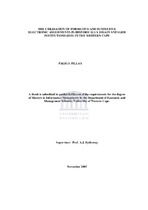| dc.description.abstract | In this thesis, I explore the benefit of electronic formative assessment on learner achievement. Studies had revealed the connection between throughput and assessment. There is great discrepancy between the throughput rate of Historically Disadvantaged Institutions (HDI) and Historically Advantaged Institutions (HAI), according to the National Plan for Higher Education. Previously, assessment was used primarily for summative and certification purposes. Now, with the introduction of Outcomes Based Education (OBE), a number of alternative forms of assessment can be used. In this study I establish the importance and necessity of frequent, electronic, formative assessments which would thereby improve learners’ achievement in the classroom.The white paper on e-education (DOE: 2003) states that e-education must be transformed so that information and communication technology (ICT) can be successfully integrated to “ensure that all learners will be equipped for full participation in the knowledge society”. Recent research has reported significant increases in learner achievement through educational technology with the use of learning management systems (LMS) software (Stephens, 2001, Buchanan, 2000, DeKock, 1994). This study was built upon this body of research on educational technology and how it can be effectively integrated into classrooms. This research would impact on learner achievement through the use of formative assessment to assist under-prepared learners to improve their summative scores. In particular, the effect of formative electronic assessment on learner achievement in the subject Business Information Systems, for first year accounting learners, in the Business Faculty at Peninsula Technikon was investigated. This quantitative study utilized the use of questionnaires and the control group design. The control group design, which consisted of the control and experimental groups was used on a group of learners who had been exposed to the treatment. The treatment for the experimental group comprised of using a formative on-line learning assessment. Independent variables included the treatment condition, race, gender and home language. Analysis of Variance (ANOVA) was used on assessment. Analysis firstly revealed that there was no statistically significant difference between achievement in the practical component between the experimental and the control group. The Kruskal-Wallis tests showed that there were no significant differences between genders. The control group performed better than the experimental group in the theory test. Secondly, analysis revealed statistically significant mean achievement differences between Coloured female with no prior computer usage (M= 78) and Black female with no computer usage (M=44). Based on these findings, implications of the results of this study, future avenues of research and implementation suggestions are offered. | en_US |

